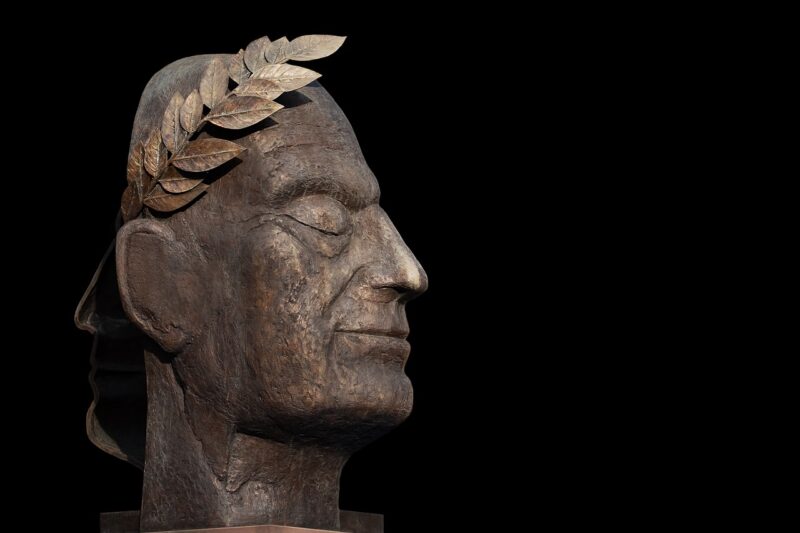
The ancient Romans were known for their complex beliefs and rituals, many of which revolved around the supernatural and the unseen forces that governed their lives. Among these rituals, the practice of holding fake funerals, known as *funeralia*, stood out as a fascinating method to ward off bad luck and misfortune. This peculiar custom has captured the curiosity of historians and laypeople alike, leading many to wonder why such a seemingly bizarre practice was so prevalent in Roman culture.
1. Understanding Roman Superstitions
To comprehend the significance of fake funerals in ancient Rome, it is essential to first grasp the complex system of superstitions that permeated Roman society. Romans believed in omens, signs, and divine intervention. They understood life and death as two sides of the same coin, where the transition from one to the other could attract both good and bad fortune.
For the Romans, bad luck could manifest through a variety of means—unfavorable omens, misinterpretation of signs, or even the actions of envious neighbors. This belief system fostered a culture in which rituals and ceremonies were performed to appease the gods and avoid their wrath, thus safeguarding one’s family and community from calamity.
2. The Practice of Fake Funerals
Fake funerals were typically staged during periods of exceptional distress, such as chronic illness, financial trouble, or even following the death of a friend or family member—when the potential for bad luck seemed most imminent. The ritual consisted of a fabricated funeral procession which included re-enactments of mourning, display of elaborate funerary objects, and even the use of effigies representing the deceased.
This act served multiple functions:
- Psychological Reassurance: By staging a mock funeral, individuals believed they could preemptively address their fears and insecurities. It allowed them to acknowledge the specter of death without succumbing to panic, providing a psychological buffer against misfortune.
- Social Solidarity: Engaging in a community ritual reinforced social bonds. The shared experience of a fake funeral reminded everyone of their mortality, enhancing camaraderie among those present.
- Spiritual Protection: Romans believed that faking one’s death served as a powerful talisman against real misfortunes. By symbolically ‘dying,’ they received spiritual protection from the gods, who might have been angered by unforeseen events in their lives.
The enactment of these faux funerals was often accompanied by other rituals such as prayers, offerings, and purification ceremonies aimed at appeasing the gods and inviting good fortune back into the lives of the participants.
3. Cultural Context: The Role of Death in Roman Society
Death held significant importance in ancient Roman culture, embodied in elaborate funerary practices that emphasized the honor and remembrance of the deceased. Roman funerals were serious events characterized by mourning attire, public grieving, and ritualistic processions.
Moreover, the Romans believed that a proper funeral ensured safe passage for the soul into the afterlife. Thus, the fake funeral, while appearing to trivialize death, was also deeply entrenched in their understanding of it. It was a means to prepare oneself—both mentally and socially—against the inevitability of death, reinforcing the belief that life was a fragile balance between fortune and misfortune.
An essential aspect of Roman funerals was the role of the *imagines*, or death masks, which could be displayed during mock funerals. Representing deceased ancestors, these masks served as a reminder that one’s lineage and family honor were continually at stake, further driving the need for such rituals to ensure they remained favored by the spirits of their ancestors.
4. The Impact of Social Status on Rituals
The Romans were a class-conscious society where social status profoundly influenced cultural practices. Fake funerals were not just a matter of choice but were often dictated by one’s status.
Wealthy Romans might stage extravagant fake funerals complete with processions and hired mourners to reflect their status and evoke envy among their peers. At the same time, lower-class individuals tended to conduct more modest versions, often utilizing makeshift effigies and simpler rituals. Nevertheless, the motivation behind the rituals remained the same—a communal effort to deflect misfortunes and bring a sense of control over their unpredictable lives.
5. Remnants of the Past: Modern Reflections
Several remnants of the practice of fake funerals can still be observed in modern culture, albeit in different forms. While today’s society may not hold mock funerals, the concept of ‘living wakes’ or celebratory memorials serves a similar purpose.
People often gather to honor the lives of loved ones who are still alive or to celebrate one’s achievements before facing life’s uncertainties.
Additionally, various cultures worldwide still perform rituals aimed at warding off bad luck, suggesting a continuation of deeply rooted beliefs about the importance of addressing death and misfortune head-on.
6. Conclusion: The Significance of Fake Funerals in Ancient Rome
In summary, the practice of holding fake funerals in ancient Rome reveals much about the society’s complex interplay of superstition, social structure, and the cultural significance of death. Through these staged events, Romans could confront their fears of misfortune and mortality while simultaneously reinforcing social bonds and community solidarity.
These rituals not only provided psychological assurance in times of distress but also served to remind individuals of their familial and societal obligations. While the institution of fake funerals may have faded with the passage of centuries, the lessons learned from this ancient practice—about managing fear, dealing with death, and the human need for connection—continue to resonate in today’s world, revealing the timeless struggles we face in our lives.








